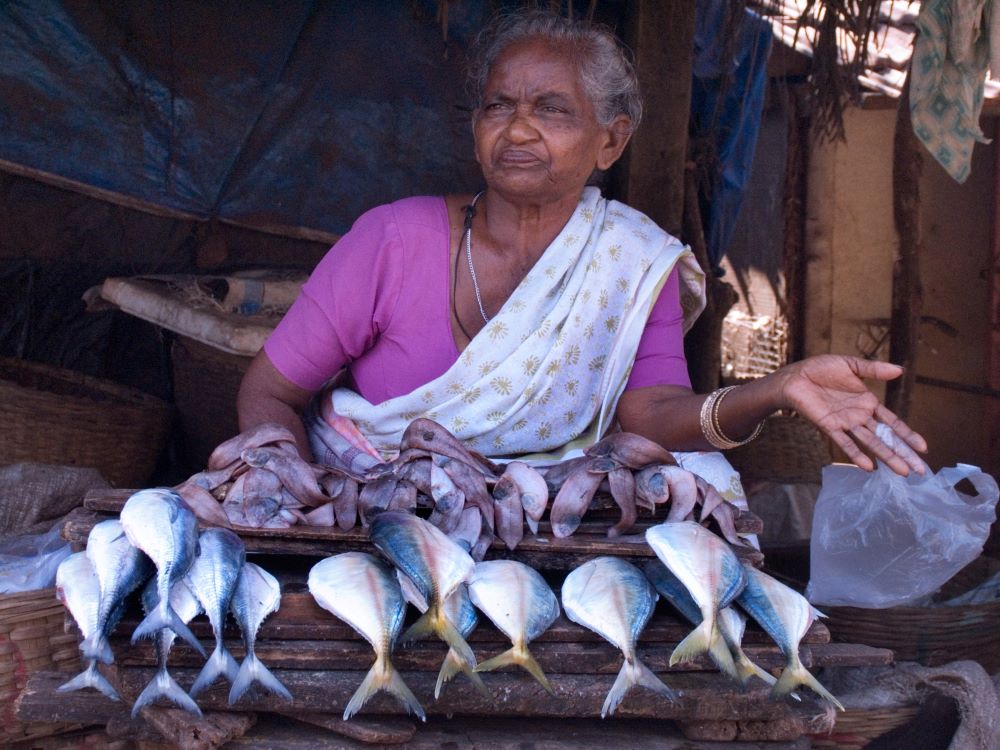
Female fish vendors in India face numerous challenges as they work to support themselves and their families. (Wikimedia/Creative Commons/CC BY-SA 3.0/Jorge Royan)
When I visit my hometown in Tamil Nadu, South India, I like to spend time with the children and women who live next door. The last time I was there I happened to talk with Minorlin, my neighbor in the village.
Minorlin must be in her 50s, and she is her family's sole breadwinner. Her husband, an alcoholic and asthma patient, never goes to work. She does not have a house of her own, because —having only one daughter and a son — she had sold the house to marry off her daughter.
The son is married and has two sons. He follows in the father's footsteps, and his family depends on the mother's earnings.
One day, when I visited her house, Minorlin was cooking. A pot was full of rice and simple curry, with not much else. I asked about her and her family. She is a fish vendor. She has to go early in the morning to the seashore to buy fish, then goes from village to village to sell the fish before noon. I have never seen her get home until evening.
There are hundreds of fisherwomen like Minorlin in Tamil Nadu and other parts of India. Each has a story of unique daily struggles, social, economic and cultural backgrounds. Despite their pervasive personal, occupational and family plights, they have a die-hard attitude to survive and sustain the families that depend on them. Above all, their spirit of resilience keeps them going.
In addition, these fisherwomen face many problems using the local public transportation system or buses: the ticket collectors do not allow them to get in, as the fish smell ruins the bus and annoys other passengers. Although the women pay fees for their baggage, they have to hear the scolding or verbal abuse and face rejection by other passengers.
Advertisement
The fisherwomen have no choice but to endure the insults with patience and humility, without rebuking them in any way.
During the lockdown due to the COVID-19 pandemic, it was very difficult for the women to sell fish. Moving from place to place, they have nowhere to use the restroom. They are treated with no dignity and have to sell the fish at lower prices as time passes and they reach the end of the day.
Like many others, Minorlin faces many hardships, as she has the responsibility to take care of the family, but she never complains about her dependents. She accepts her situation with courage and confidence and moves ahead with life for the sake of the family, while trusting in herself and divine providence. Although she is tired at the end of the day, she is ever willing to serve her husband, children and grandchildren.
I could just feel her love for her husband, children and grandchildren. What an example of love and generosity! She and women like her are heroes of love and hope, who face life as it comes.
Seeing and observing Minorlin, and knowing what she has experienced in life, I was reminded of many women in the Bible; some aspects of her life resonate with those women in the sacred Scripture.
Interestingly, many women in the Bible show life in its fullness, serving the needy, loving, and caring for others, though they had had their own struggles.
Reflecting on the parallels between Minorlin and those women in the Bible, I find that women are an image of love and sacrifice. They stand for what they believe.
Pondering the love of our Heavenly Father and the sacrifice of Jesus — who never had any complaints about us — it seems we humans always complain about everything.
When we trust fully in the providence of God, we are satisfied with our lives. Often, those who have less will live their life fully with faith, hope and love — the three theological virtues — like the widow who offered all that she had (Mark 12:41-44).
Mother Mary, the role model of all women in the history of humankind, helps in the salvation of humanity, as when she reminded Jesus that they were out of wine (John 2:3).
And look how Martha became busy serving Christ and his disciples (Luke 10:38-42). She showed the happiness she found in serving and loving others.
Womanhood is a gift to humanity. Women of the world give life to others with love, sacrifice and commitment, no matter where they live and what they do. They are an embodiment of God's love for others. We cannot but be grateful to women for what they do and what they are for humanity in society, despite the many challenges they face all over the world in their different social, economic, religious, cultural and political contexts.
Thinking and reflecting on the role and responsibility of women, I was reminded of how nuns/religious women — who have offered themselves to God — should cherish our sacred calling for the people we serve around the world with our distinctive ministries. It would not be wrong to say that we have given our lifetime to God and Church, as married women give their time and service 24/7 to their families. Likewise, we nuns dedicate our lives fully for the sake of God's glory and in service to humanity.
If our dedication is for those who are in need — children, youth, women, elderly, differently-abled, orphans, the poor, and the marginalized — we will be as happy as Mother Mary when she met Elizabeth (Luke 1:39-45).
The role of women religious in the church is immense. Our lives should imitate the life of Mother Mary.







